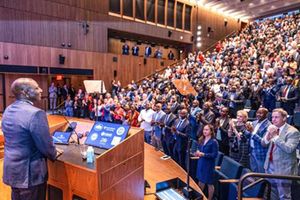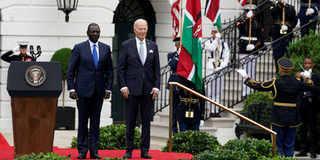
U.S. President Joe Biden welcomes Kenyan President William Ruto during an official White House State Arrival ceremony on the South Lawn of the White House in Washington, U.S., May 23, 2024.
President William Ruto’s trip to the United States has largely been seen as success, earning Kenya a slot on the list of Major non-NATO allies.
Dr Ruto, however, says Kenya will not be a puppet of the US. In an interview on Friday, President Ruto suggested Kenya would be looking out for its own first, dismissing criticism of playing the East and West. “It is not a question of people saying we are facing West or East. We are facing forward,” the President said. President Ruto’s predecessors – Uhuru Kenyatta, Mwai Kibaki, Daniel Moi and Jomo Kenyatta – also struggled with identity on foreign policy.
But even they mostly found favour in Washington, without injuring relations with Russia and China – America’s rivals on international scene. As a Major Non-NATO Ally (MNNA), Kenya – should the US Congress approve – will earn certain privileges given to members of the North Atlantic Treaty Organisation, a mutual defence cooperation bloc in the West.
The benefits will be in defence, trade and security cooperation even though the US will not be tied to defending Kenya were it to be attacked by a foreign entity.
“The Major Non-NATO Ally designation is a powerful symbol of the close relationship the US shares with those countries and demonstrates our deep respect for the friendship for the countries to which it is extended,” says a note on the State Department’s website. “While MNNA status provides military and economic privileges, it does not entail any security commitments to the designated country.”
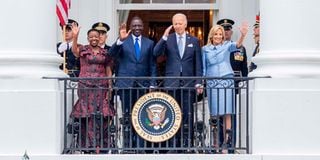
President William Ruto and US President Joe Biden with their spouses Rachel and Jill at the White House, Washington, DC on May 23, 2024.
MNNA gives Kenya access to strategic and security partnership with the US and will include closer cooperative research and development, exemptions on arms control for weapons export to Kenya as well as planting of certain US military facilities on Kenyan soil.
One of the items listed in the Fact Sheet on US-Kenya ties indicates Manda Bay air base will be expanded and its runway renovated. Kenya will join Egypt, Morocco, Argentina, New Zealand, Saudi Arabia, Thailand, Singapore, the Philippines, Tunisia, Pakistan, Brazil, Qatar and Colombia on the MNNA list. Analysts, however, say Kenyans should not expect free lunch.
Kenya will have to spend huge sums on refurbishing 16 US-made helicopters.
Being a US and NATO ally could also make the country a victim of a geo-political war. In the past, when Kenya joined the US in the “war on terror”, it got attacked by groups linked to al-Qaeda, including al-Shabaab.
The war is ongoing, mainly involving al-Shabaab militants. Washington expects Nairobi to take on more assignments in return.
“Our joint counter-terrorism operations have degraded the Islamic State (IS) group and al-Shabaab across East Africa. Our mutual support of Ukraine has rallied the world to stand behind the United Nations Charter, and our work in Haiti is paving the way to security,” US President Joe Biden said at a joint press conference with his Kenyan colleague in Washington on Thursday.
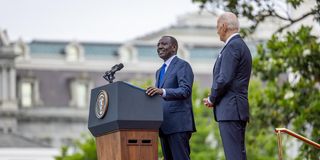
President William Ruto addresses a press conference at the White House with US President Joe Biden on May 23, 2024.
“Our new partner, global partnership, will build on all this progress. We are going to meet new challenges with more resources. It’s going to strengthen the security of our countries and countries around the world.” Some experts think Kenya now has great opportunity with which to advance its stature across the continent, but must exercise caution by not jeopardising relations with China and Russia.
“The decades-long relationship between Kenya and the US makes a strong case for President Ruto to renew and intensify partnerships with America after years of the ‘Look East’ policy of his predecessors,” said Dr Mustafa Y Ali, Chairman of the Horn Institute, a think-tank based in Nairobi.
He added that the new developments could also raise a challenge in relations with the East. “Kenya will have to deploy its sharpest and most shrewd security experts, diplomats and negotiators to ensure such a designation is translated into practical gains against what it will potentially lose in future in an increasingly multi-polar world,” Dr Ali told the Sunday Nation, adding that some countries like Singapore profited from both sides without antagonising anyone.
Though initially billed as an occasion to discuss trade and investment, the state visit revealed Kenya could have the biggest American military base in Africa. The gesture includes getting more armoured military vehicles. American military presence on the continent has faced a lot of criticism.
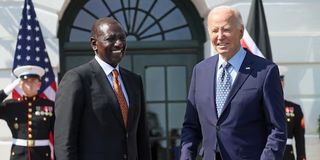
U.S. President Joe Biden welcomes Kenyan President William Ruto at the South Portico of the White House in Washington, U.S., May 22, 2024.
Junta-led administrations in Niger, Mali, Guinea and Burkina Faso have been cutting ties with the US and France in favour of Russia. Chad recently asked some US forces to leave the country.
A diplomatic source said the US’ plan to establish a training base in Wajir would compensate for the losses in the Sahel.
Additionally, the United States will deploy seven advisers in Kenya to support local aviators and send a strategic logistic adviser to the Ministry of Defence. David Monda, political scientist at the City University of New York, says Washington is offering cooperation on all fronts because Kenya is interested. “Kenya has taken positions in concert with the US on the Ukraine-Russia war and its support for Israel’s right to self-defence. Kenya is an influential member of the UN and the African Union, which is of value to the US,” Prof Monda told the Sunday Nation.
The US, like other world powers, is looking for markets, sources of raw material just as well as human resources needed to fuel its economy, he added. “The US would like to access the growing African middle class and its skilled youthful population for American goods and services.
America is also concerned about the expansion of Russian and Chinese influence on the continent where it has had historical linguistic, security, diplomatic and economic ties,” Prof Monda said. The two presidents spoke of democracy and human rights at the White House.
Washington pledged funding to help fight corruption in Kenya and an association of watchdogs in East Africa.
Traditionally, the USs has pushed good governance and human rights as an appendage to its relations with other countries. Lately, it has added sexual orientation rights, environmental responsibility and climate change. Countries like Uganda and Ghana, which imposed stiff penalties on LGBTQ groups, saw their aid cut. Rwanda, which banned the importation of second hand clothes from the US, had its market access via the Africa Growth Opportunity Act suspended. Kenya will have to tread carefully.
At the White House, the two leaders avoided LGBTQ+ issue directly even though they spoke of human rights and inclusivity. Dr Ruto, who is opposed to LGBTQ+, spoke of Kenya as a democracy that protects minorities. His advisers had done thorough job to tell him to stop at that point.
In spite of the coziness, the US has often come in hard on Kenyan officials involved in corruption, denying them visas. These conditions do not always count when it comes to China and Russia. It may explain why a recent Gallup Poll showed China’s influence in Africa had topped the US.
“The US sees Africa as a place to spread democracy, good governance and the rule of law; models that appear to be challenged by Russia and China, countries that stress non-interference in internal affairs of other states,” Prof Monda said.
“China and Russia lay emphasis on order and alternative development models to the liberal democratic ideals of the US.” The Chinese have lately been pushing for a new principle known as “positive-sum” game, which directly attacks what the country’s leaders see as the West’s “zero-sum” game.
In Kenya, the Chinese have promised to build the headquarters of the Ministry of Foreign Affairs, adding to their recent “buildings-of-friendship” policy on the continent.
Vincent Ongore, a professor of Strategy and Corporate Governance at the Technical University of Kenya, says Kenya’s existing free spaces have provided some element of trust to the United States that can be used elsewhere in the region.
“The country is actively supporting peace efforts in the Democratic Republic of Congo, Somalia, Ethiopia and South Sudan,” he said.
“Kenya requires adequate facilitation to enable it discharge these onerous responsibilities on behalf of its neighbours in conflict situations.” He is happy Kenya secured funding for the efforts.
As part of an assignment, Kenya will be supported to lead three mediation roles – seeking peace in South Sudan, lobbying for dialogue between Ethiopia and Somalia over Somaliland and pushing for truce in Sudan. A diplomatic source, however, indicated that Nairobi sees involvement in the South Sudan peace efforts as a diplomatic dividend.
Last week, President Ruto convinced some civil society movements to sign a declaration for peace with armed groups, the idea being a drive to weaken desire for violence.
Aggrey Mutambo, Roselyne Obala and Luke Anami


